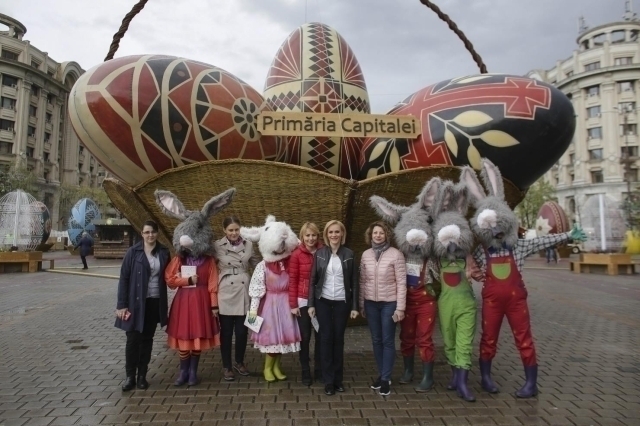After the Easter Holiday
Like every year, the Romanians, most of whom are Orthodox, celebrated Easter with their families, at home, in the mountains or abroad

România Internațional, 19.04.2017, 13:11
In 2017, Christians around the world celebrated Easter on the same day, on April the 16th, Christianity’s biggest and oldest celebration. “Christ is risen!”, “He is risen, indeed!”, is how the majority Orthodox Romanians received the news of Christ’s resurrection. Many of them attended the religious services held in churches and monasteries across the country and in Orthodox churches abroad.
Respecting centuries-old traditions and customs, Romanians sat at the Easter table on Sunday, the first day of Easter, alongside their families, enjoying specific dishes: red-painted eggs, lamb steak, pound cake and Easter cake, as well as lamb organs terrine and wine. On Monday, on the second day of Easter, many visited their friends and relatives or went out for a walk in the park.
Most Romanians this year preferred to stay at home for the Easter holiday and, according to an IRES poll, they spent around 110 euros for the traditional Easter meal. More than 100,000 Romanians spent Easter in the mountain resorts in the Prahova Valley, Bukovina and Maramures, areas with traditions and customs. The seaside was almost empty, as only 900 Romanians spent Easter there.
Romanians spent more than 7 million euros on tourist services in Romania, according to employees associations in the travel industry, although prices rose by 2 to 5% compared with 2015. Rural guesthouses were the most popular forms of accommodation.
Spending Easter in the countryside was a popular choice, offering peace and quiet for people living in busy cities and a way to go back to traditions. Some Romanians spent their Easter holiday abroad. The most popular foreign destinations were the Bulgarian Black Sea coast, followed by the Greek coast and Tenerife, in Spain.
Holiday plans were somewhat upset by the unseasonably cold weather. Snow, rain and strong winds were reported in many areas around the country.
In Bucharest, the city hall cancelled an outdoor concert and cut short an Easter fair in the centre of the city. The fair sold authentic Romanian products, including objects made of wood, glass and ceramic, musical instruments, traditional costumes and food. The fair also had an area for children, with train rides, a merry-go-round and workshops where artists and actors helped the children express their creativity.
Many Romanians living and working abroad returned to their home country for the Easter holiday to be with their loved ones. Those who stayed in their new countries still celebrated Easter in the Romanian fashion with traditional products sent by their loved ones in Romania.(Translated by C. Mateescu, edited by D. Vijeu)






























